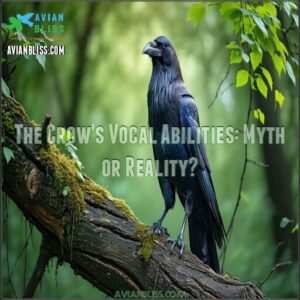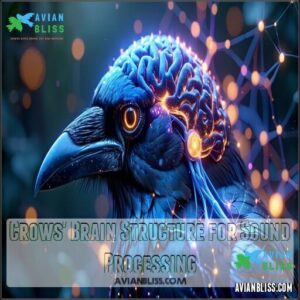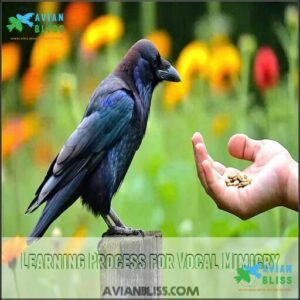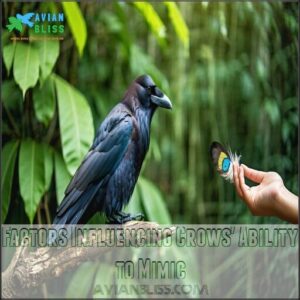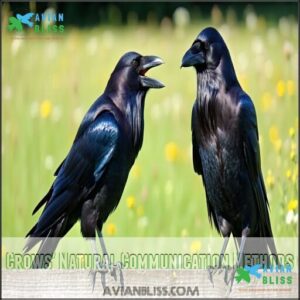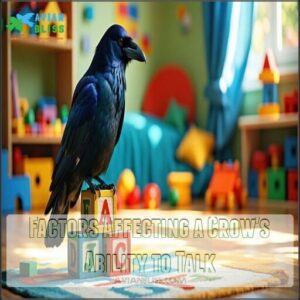This site is supported by our readers. We may earn a commission, at no cost to you, if you purchase through links.

They often mimic noises around them, like car alarms or dog barks, which shows their intelligence.
Both birds mimic sounds using a syrinx, their vocal organ, but parrots are better at it due to their specialized brain regions for learning sounds.
Crows can imitate human words if trained patiently, usually in captivity. If you’re curious about teaching a crow, timing, repetition, and rewards matter.
Explore the realm of crows, and you’ll see they’re full of surprises!
Table Of Contents
- Key Takeaways
- The Crow’s Vocal Abilities: Myth or Reality?
- How Crows Mimic Human Speech
- Common Words and Phrases Crows Can Say
- Teaching Crows to Talk: Techniques and Tips
- Crows’ Understanding of Human Language
- Other Corvids With Speech Mimicry Abilities
- Why You Rarely See Talking Crows
- Crows’ Natural Communication Methods
- Factors Affecting a Crow’s Ability to Talk
- Ethical Considerations of Teaching Crows to Talk
- Frequently Asked Questions (FAQs)
- Can a crow speak like a parrot?
- Can ravens imitate human speech?
- Can a crow be taught to talk?
- Can a crow talk if you split its tongue?
- What birds can talk with a parrot?
- Do Crows talk like parrots?
- Are crows a talking bird?
- Do Crows use their tongue to talk?
- Are crows like parrots?
- Do Crows communicate with humans?
- Conclusion
Key Takeaways
- Crows can mimic human speech using their syrinx, but their words aren’t as clear or fluent as parrots’.
- Younger crows in engaging environments with patient training, repetition, and rewards are more likely to mimic words.
- Unlike parrots, crows rely on environmental sounds and survival instincts, limiting their focus on learning human speech.
- Teaching crows to talk impacts their natural behavior and survival skills, so it’s important to prioritize their well-being.
The Crow’s Vocal Abilities: Myth or Reality?
You might be surprised to learn that crows can actually mimic human speech using their syrinx, though their abilities aren’t as developed as those of parrots.
Their vocal organ allows them to reproduce simple words and phrases, but they typically have a more limited vocabulary and less clear pronunciation compared to their more famous talking bird counterparts, such as parrots.
Crow’s Syrinx Structure and Function
The crow’s syrinx, situated at the junction of the trachea and bronchi, functions as nature’s most sophisticated sound-production system.
Nature’s marvel, the crow’s syrinx is a masterful vocal organ, crafting sounds from raspy caws to mimicry magic.
Unlike the human voice box, this remarkable vocal organ gives crows impressive acoustic abilities through precise muscle control and airflow dynamics.
Three key aspects of crow syrinx anatomy:
- Dual-sided operation – Independent control of each half creates complex sound combinations
- Tympaniform membranes – Vibrate at various tensions to produce diverse frequencies
- Specialized muscles – Nine pairs work together for fine-tuned vocal range
When air passes through this intricate bird anatomy, the resulting vibrations can produce everything from harsh caws to subtle clicks, showcasing their extraordinary vocal versatility.
These birds also benefit from regular access to water to maintain their health.
Comparison With Parrot Vocal Abilities
Parrots may steal the show with their polished speech, but crows bring their own rugged charm to avian mimicry.
While parrots boast fluency and a larger vocabulary size, crows excel at imitating environmental sounds with their gritty crow vocalization.
Their learning speed lags behind parrots, but their intelligence keeps them in the game.
Here’s how they stack up:
- Parrot fluency: Parrots articulate words more clearly.
- Vocabulary size: Parrots learn more words.
- Learning speed: Parrots pick up sounds faster.
- Anatomical differences: Parrots’ tongues aid precision; crows rely on their syrinx.
- Cognitive understanding: Both species mimic, but parrots grasp meaning better.
Types of Sounds Crows Can Produce
You’d be surprised how versatile bird sounds can get, especially with crows.
Their vocal range goes far beyond the classic “caw.” Crows produce sharp rattles, soft coos, and even mimic environmental noises like car horns or animal calls.
Thanks to their syrinx function, they excel at avian vocalizations, adapting tones for different situations.
Whether it’s loud alarm calls or subtle social chatter, crow sounds are all about survival.
They even develop dialect variations based on their region. While not as fluent as parrot speech, their avian mimicry showcases a fascinating ability to replicate and innovate within their environment.
How Crows Mimic Human Speech
You might be surprised to learn that crows can mimic human speech using a specialized vocal organ called the syrinx.
Their brain structure, packed with neurons, allows them to process and replicate sounds through repetition and memory.
Crows’ Brain Structure for Sound Processing
It’s amazing how a bird’s brain, even one as small as a crow’s, handles sound processing like a pro.
Their brain structure is built for this. The nidopallium acts like a sound detective, analyzing and interpreting what they hear. Meanwhile, song nuclei—specialized regions for crow vocalization—manage precise sound production.
With over 1.5 billion neurons, their brain functionality is fine-tuned for learning.
Here’s how it works:
- Nidopallium function deciphers complex sounds.
- Neural pathways link sounds to memory.
- Song nuclei handle vocal control.
- Lateralization supports multitasking.
- Brain plasticity adapts to new sounds.
This brilliant setup explains how crows mimic human speech, even with their “bird brain.”
Learning Process for Vocal Mimicry
Teaching a crow to mimic sounds is like guiding a child through their first words—timing and method matter.
During their prime learning phase, around 6 to 12 months, crows are most receptive to bird vocal learning. Trust building is your first step; a crow that feels safe will engage more in training.
Start with simple, energetic phrases like “hello.” Repetition importance can’t be overstated here—consistent practice solidifies crow mimicry ability.
Pair words with small rewards, like seeds, to boost mimicry motivation. Think of crow vocalization training as a blend of patience and science.
Your consistency in training helps shape their language learning. Soon, you’ll witness their sharp minds mimicking sounds, turning bird training into a fascinating showcase of their intelligence.
Factors Influencing Crows’ Ability to Mimic
A crow’s mimicry ability depends on a mix of factors, blending age, environment, and temperament.
Younger crows, especially between 3-12 months, excel at vocal learning. A stimulating environment filled with human interaction boosts their bird mimicry skills. Consistent training, like repeating simple words, strengthens their ability to imitate.
Genetics also plays a role—some crows are naturally better at picking up sounds.
- Age and learning: Younger crows adapt quicker.
- Environment’s impact: Interaction-rich settings help.
- Temperament effects: Shy crows may struggle.
- Training consistency: Repetition guarantees progress.
- Genetic predispositions: Some crows are born mimics.
With patience and practice, teaching crows to talk becomes a fascinating glimpse into crow intelligence and bird vocal learning.
Common Words and Phrases Crows Can Say
Crows can mimic simple words like "hello" or "hi," especially when exposed to frequent human interaction.
Their speech isn’t as clear or varied as a parrot’s, but their ability to repeat sounds is still impressive.
Most Frequently Mimicked Human Words
Crows, with their sharp intelligence and mimicry skills, often pick up words they hear repeatedly.
While their vocabulary isn’t as vast as a parrot’s, they can still surprise you with their ability to mimic human speech. Common greetings and simple commands are among their favorites.
Here’s what crows frequently mimic:
- “Hello” or “Hi”, often in cheerful tones.
- “Jake” or other names they hear regularly.
- Food-related words like “Peanut!”, tied to sound associations.
- “Bye-bye”, adding a playful touch to their mimicry.
Complexity of Phrases Crows Can Learn
Crows can surprise you with the complexity of phrases they mimic, though their abilities come with mimicry limitations.
They’re not parrots, but they’ve got impressive crow communication skills. With consistent teaching, they can repeat phrases like “Good morning!” or even “Where are you?” Their phrase length and grammatical accuracy depend on training and cognitive load.
They also demonstrate an impressive ability to understand recursive sequence generation.
Here’s a quick look:
| Skill Level | Example Phrase | Complexity |
|---|---|---|
| Beginner | “Hi” | Low |
| Intermediate | “Come here” | Medium |
| Advanced | “Where are you?” | High |
While crows lack contextual usage of words, their animal communication shines through mimicry. Teaching crows simple phrases reveals their intelligence, rivaling some parrot talking abilities.
Clarity of Crow Speech Compared to Parrots
In the context of bird speech, crows bring their raspy charm, but they fall short of parrot fluency.
Their vocal anatomy plays a big role in this difference. Here’s why:
- Syrinx structure: A crow’s syrinx isn’t as refined, leading to rougher sound production.
- Tongue flexibility: Unlike parrots, stiff tongues limit their ability to shape sounds.
- Mimicry accuracy: Crows imitate human speech with a distinct “caw” undertone.
- Learning curve: While clever, they need more repetition to achieve clarity.
Despite crow limitations, their communication skills shine through. Their human speech imitation might lack polish, but their mimicry accuracy still fascinates bird enthusiasts worldwide.
Teaching Crows to Talk: Techniques and Tips
You can teach crows to mimic human words by starting early and using consistent repetition. Pairing simple phrases with rewards, like food, builds trust and encourages them to learn.
Best Age to Start Training
Starting early is key when teaching crows to talk.
The imprinting period between 3-12 months is ideal, as young crows are in their prime cognitive development stage. During this time, their learning capacity is high, making them more receptive to mimicry. Think of it as their "language sponge" phase.
Consider crow training products for superior results. By focusing on early vocalization, you can build trust and set a strong foundation for training.
Juvenile crows respond well to enthusiasm and repetition, but consistency is vital. While fledglings may bond socially, their attention can wander.
Older crows, though trainable, require more patience. Keep sessions short, use rewards strategically, and nurture their natural curiosity for the best training duration outcomes.
Effective Teaching Methods and Repetition
When teaching crows to mimic speech, structure matters. Start with short but frequent training sessions, keeping their attention spans in mind. Speak clearly and emphasize simple words like "hello" or "hi" during daily interaction.
Enthusiasm is your best tool—crows respond well to energy in your tone. Repetition builds confidence. Think of training as laying bricks; each practice reinforces their ability to mimic.
Focus on one word at a time to avoid confusion. Slow syllable emphasis helps crows grasp patterns better. Patience is key—they might mimic random sounds before clarity sharpens.
Keep sessions positive and consistent. Some resources can help you effectively teach speech. Building trust through regular contact strengthens their willingness to learn.
Training frequency and session duration, paired with precise repetition, release their vocal potential over time. With consistent effort, crows can learn to mimic speech effectively, making the training process a rewarding experience.
Rewards and Positive Reinforcement Strategies
Building on effective teaching methods, the right rewards and positive reinforcement can make your crow’s training soar.
It’s all about creating a fun, rewarding environment that encourages them to mimic sounds.
Here’s how to do it:
- Food Rewards: Offer their favorites—bits of nuts, small fruits, or mealworms.
- Verbal Praise and Tactile Reinforcement: Pair treats with enthusiastic phrases like “Good job!” or gentle head scratches.
- Clicker Training and Consistent Schedule: Use a clicker to mark correct behavior, followed by a treat.
Timing is key; reward them immediately after they mimic correctly. Your energy boosts their keenness to learn. Stick to short, 10–15 minute sessions daily for focused progress.
Each reward strengthens their association between mimicry and positive outcomes. Consider various options for crow specific snacks to keep them engaged.
With consistency and enthusiasm, your crow will enthusiastically show off its growing vocal skills, one “hello” at a time!
Crows’ Understanding of Human Language
You might think crows understand the words they mimic, but their grasp of language is limited.
While they can associate some sounds with objects or actions through repetition, they don’t truly comprehend human speech.
Associating Words With Objects or Actions
Crows are masters of Word Association and Object Recognition, though their Limited Comprehension sets them apart from parrots.
Think of it like teaching a toddler new words—they mimic sounds tied to actions or objects. For example, repeatedly saying “treat” while offering food helps the crow link the word to snacks.
This process, called Action Mimicry, showcases their knack for Contextual Learning.
Here’s how it works:
| Action | Word | Object | Context |
|---|---|---|---|
| Offering food | "Treat" | Food | Positive reinforcement |
| Dropping a twig | "Stick" | Stick | Tool-use recognition |
| Retrieving an item | "Fetch" | Ball | Play reward |
| Pecking a shiny item | "Shiny" | Coin | Curiosity and interaction |
While crows mimic sounds, their understanding remains basic, reflecting their unique place in animal communication studies.
Limitations of Crows’ Language Comprehension
Hearing a crow say “Hello” might make you think it understands you, but it doesn’t.
Their vocal mimicry is impressive, yet their cognitive capacity limits true comprehension. Unlike parrots, crows focus on instinctual behavior, not casual conversation.
Here’s what holds them back:
- Mimicry vs Meaning: Crows repeat sounds but lack contextual understanding or grammar.
- Limited Vocabulary: They stick to basic sounds, unable to grasp complex phrases.
- Instinctual Behavior: Their brains prioritize survival, not mastering human language.
Crow language studies reveal they’re brilliant mimics, yet their vocalizations remain surface-level. It’s animal communication at its finest, just not parrot-level talking ability.
Other Corvids With Speech Mimicry Abilities
You might be surprised to learn that crows aren’t the only corvids capable of mimicking human speech.
Ravens, magpies, and even jackdaws also show impressive vocal abilities, producing sounds that range from words to environmental noises.
Ravens and Their Vocal Capabilities
Ravens, like crows, are masters of bird sounds imitation, but they take it to a whole new level. Their vocal anatomy, combined with sharp intelligence, allows them to produce a stunning variety of sounds.
If you’ve ever heard a raven, you know their vocalizations can be surprisingly human-like, leaving you wondering if someone’s playing tricks.
What sets them apart is their ability to mimic with incredible precision. They don’t just copy sounds—they replicate them so well you might mistake their calls for the real thing.
Here’s what ravens can do:
- Mimic deep human-like croaks or voices
- Imitate barking dogs, meowing cats, or other animals
- Reproduce mechanical noises like car alarms or ringing phones
- Create complex whistles and rhythmic clicks
Raven intelligence and mimicry differences make them stars of the bird language world.
Magpies and Their Mimicry Skills
Magpies, the virtuosos of the Corvidae family, are famous for their impressive mimicry skills.
Their vocal range spans barking dogs, car alarms, and even snippets of human speech, showcasing their knack for bird sounds imitation.
Unlike crows, magpies often display wild mimicry, weaving sounds into their environment like composers crafting a symphony.
These birds possess a remarkable learning capacity, mastering their mimicry accuracy through social learning and observation.
Magpie dialects emerge as they adapt sounds to their surroundings, creating unique vocal patterns that set them apart.
Scientists believe this ability highlights their advanced intelligence and adaptability.
Magpies use their mimicry not just for fun but as a tool to mark territory or communicate within their groups.
Their vocal range and sharp intelligence make them standout performers in nature’s orchestra, blending creativity with practicality, and showcasing their ability to thrive in various environments with unique vocal patterns.
Comparison of Talking Abilities Among Corvids
Magpies might be the pranksters of the bird world, but they’re not the only corvids with impressive vocal tricks.
Corvid vocalizations showcase unique mimicry nuances across species, blending intelligence with their syrinx anatomy.
Let’s explore how these talking birds compare:
- Ravens: Known for their sharp learning potential, they mimic human speech and environmental sounds with surprising clarity.
- Magpies: Experts in blending words and noises, they’re the multitaskers of bird mimicry.
- Steller’s Jays: Cleverly imitate predator calls, often outsmarting threats in the wild.
- American Crows: While their bird talking ability is more limited, consistent exposure in captivity effects their mimicry success.
Each species proves mimicry is more than just parrots’ territory!
Why You Rarely See Talking Crows
You don’t often see talking crows because their natural behaviors prioritize survival over mimicry.
Wild crows rarely interact closely with humans, limiting their exposure to speech and opportunities to learn.
Natural Behavior and Shyness Around Humans
Although crows are intelligent, their wild crow behavior often keeps them distant from humans.
This isn’t just shyness—it’s a survival tactic honed over generations. Unlike parrots, which thrive on human interaction, crows instinctively avoid close contact, maintaining a safe buffer of at least 25 feet.
This wariness stems from their natural behavior, where trust is hard-earned and fear of predators, including humans, dominates.
Such crow shyness factors limit opportunities for mimicry or bonding. Even in urban areas, where some crows adapt, they remain cautious.
Without consistent human interaction effects, like trust-building, teaching them speech becomes a major domestication challenge. Their aloofness reflects remarkable survival instincts, not disinterest.
Limited Exposure to Human Speech in The Wild
Wild crows rarely mimic human speech because they simply don’t hear it enough.
Unlike parrots or captive crows, their daily lives revolve around survival communication and instinctive behaviors. They focus on mastering Rural Crow Vocalizations like predator alarms, food alerts, and social calls to navigate their environment effectively.
Limited human contact means these birds prioritize their own complex language over mimicry. Their vocal learning is shaped by the needs of their flock, not by exposure to human words.
Without regular interaction with people, Wild Crow Mimicry remains undeveloped, leaving them fluent in bird communication but uninterested in copying human speech. Survival always comes first.
Differences in Captive and Wild Crow Behavior
In the wild, crows rely on their survival instincts, keeping their distance from humans and focusing on flock dynamics.
Captivity, however, changes everything. When surrounded by people, crows adapt quickly, showcasing remarkable learning differences. They form bonds with their caretakers, shifting their communication from wild autonomy to human-centered interactions.
This adaptability highlights how captivity effects influence bird behavior. Unlike their wild counterparts, captive crows mimic speech and sounds, revealing hidden communication abilities.
- Captive crows often mimic human speech due to consistent exposure.
- Wild crows prioritize survival instincts, avoiding human contact.
- Socialization impacts in captivity focus on human interaction over flock behavior.
Teaching crows in captivity reveals skills they’d never use in the wild.
Crows’ Natural Communication Methods
Crows use a range of vocalizations, from sharp caws to soft clicks, to share information like warnings or food locations.
They also rely on body language, such as wing movements and head tilts, to communicate with one another, utilizing vocalizations to convey their messages.
Variety of Vocalizations and Their Meanings
Crows don’t just squawk—they’ve got a whole vocal toolkit! Their "caw" warns of danger, while softer songs build social bonds.
Quick, sharp calls alert others to food, and purring sounds are for parent-offspring chats. Low rattles? Those mark territory.
Fascinatingly, crow dialects—regional variations in their calls—mirror human accents. Some even weave urban noises or speech snippets into their chatter, showing off their sound imitation skills.
This vocal complexity highlights their adaptability and keeps crow language study buzzing in animal linguistics research. Like other birds, crows also use body posture cues to communicate.
- Caw for danger: A built-in alarm system
- Food calls: Sharing the buffet news
- Purring sounds: Family-only whispers
- Territorial rattles: "This is my turf!"
- Regional dialects: A crow’s local accent
Non-vocal Communication Among Crows
In the context of communication, crows are masters of nonverbal cues. Their body language often speaks louder than their famous caws. For instance, a crow’s posture can tell you plenty: when they extend their wings slightly, it signals readiness, while a relaxed stance shows they’re at ease.
Pay attention to their visual signals like head-bobbing—it’s a surefire sign of curiosity or excitement. Want to know if a crow trusts you? Watch their gaze. They’ll lock eyes with friends but avoid contact with anything they see as a threat.
Even their feather displays carry meaning. A fanned tail signals irritation or dominance, while drooped feathers may suggest submission or illness.
This intricate system of nonverbal communication helps crows maintain their social hierarchy and showcases their incredible animal cognition. It’s a silent demonstration of their intelligence and adaptability.
Regional Dialects in Crow Populations
Birds don’t just chirp; they chat—especially crows! Regional dialects show how complex their social learning is.
Different geographies create unique crow “languages”:
- American crows west of the Cascades have lower-pitched calls due to historic hybridizations.
- Australian crows make “wab wab” sounds, unlike their American cousins.
- Dialects evolve via Crow Culture, adapting as flocks exchange vocal cues through bird communication.
Interestingly, when crows relocate, they adjust their vocal patterns to fit in—proof of impressive vocal learning rooted in Geographic Isolation.
Factors Affecting a Crow’s Ability to Talk
A crow’s ability to mimic human speech depends on factors like its temperament, environment, and overall health.
Young crows raised in engaging settings with consistent interaction tend to learn faster and more clearly than others, which can be influenced by their temperament.
Individual Temperament and Personality
If you’ve ever wondered why some crows mimic speech while others stay silent, individual temperament holds the answer.
Every crow has a unique personality that shapes its willingness to mimic sounds. Bold, curious crows often plunge into vocal mimicry with enthusiasm, while shy ones are more cautious, sticking to observation. This personality impact stems from factors like genetics and early experiences.
Outgoing crows, brimming with confidence, build trust with humans faster. This trust creates more opportunities for mimicry training. Conversely, crow shyness can limit interactions, slowing the learning process.
Crows with an adventurous nature are typically more engaged in problem-solving and vocal experiments. Their intelligence is also boosted by a highly developed pallium.
Mimicry willingness grows when crows feel comfortable and receive rewards, like treats or praise, during training. Understanding a crow’s vocal temperament helps trainers tailor techniques. Ultimately, personality makes all the difference in crow mimicry skills.
Environmental Influences on Learning
Your surroundings shape how well a crow learns to mimic.
Three environmental influences play a key role:
- Urban vs. Rural: Urban crows hear more sounds—car horns, conversations, even alarms—boosting their mimicry skills.
- Human Interaction: Captivity effects show that frequent, calm exposure to humans enhances vocal adaptation and imitation.
- Habitat Complexity: Rich environments filled with varied sound patterns, like zoos or bird sanctuaries, encourage altered communication patterns.
These settings foster better learning than monotone surroundings, and when crows adapt to environmental influences, they can develop unique vocalizations.
This blend of curiosity and adaptability makes crows fascinating examples of avian intelligence.
Health and Physical Factors
A crow’s ability to mimic human speech depends heavily on its physical health.
The syrinx anatomy, not the larynx, drives vocal clarity and sound range. If the syrinx or bronchial tubes are damaged, mimicry development suffers.
Brain size is another big factor—memory and sound processing hinge on healthy neural structures.
Unlike parrots, crows don’t use their beaks much for vocal adjustments, but keep their windpipe and anatomy in shape.
Captive crows with consistent care often outshine their wild relatives in vocal clarity.
Ethical Considerations of Teaching Crows to Talk
When you teach a crow to mimic human speech, you might unintentionally impact its natural instincts and behavior.
It’s essential to prioritize the bird’s welfare, as excessive stress or captivity can harm its overall health and survival skills, which is crucial for its survival.
Impact on Natural Behavior and Survival Skills
Teaching crows to mimic human speech may seem fascinating, but it can impact their natural behavior and survival skills in the wild.
Wild crows rely on their vocal learning for critical survival tactics like alerting each other to danger or finding food. When they focus on human sounds, some key instincts could waver:
- Altered Communication Patterns – Mimicry might replace their warning calls, which are essential against predators.
- Social Disruption – Crows not using typical sounds could confuse their flock, weakening group coordination.
- Foraging Changes – Practicing speech might cut into time spent mastering food-finding strategies.
- Survival Rates – Mimicry may dull responses to environmental cues that signal danger or opportunity.
So, while vocal learning is a marvel, prioritizing human words over crow instincts could burden their wild mimicry and survival rates.
Stress and Welfare Concerns in Captivity
Captivity can be a real challenge for crows, often leading to captive stress and serious welfare risks. These highly intelligent birds thrive on engagement and environmental enrichment, and without it, they can experience boredom and behavioral changes.
Pacing, feather plucking, or lost appetite often signal underlying stress issues. Social isolation in confined spaces makes it worse. While parrots can chat away their loneliness, crows need bonds too—whether with humans or feathered friends.
Adding to the stress, constant noise, like loud TVs or machinery, can be unsettling. Captivity itself is a form of mistreatment, often resulting in psychological harm.
Here’s how to support their welfare:
| Concern | Solution | Impact on Behavior |
|---|---|---|
| Limited space | Provide spacious enclosures | Promotes natural behavior |
| Social isolation | Introduce social interactions | Reduces stress behaviors |
| Lack of enrichment | Offer puzzles & toys | Encourages mental engagement |
Prioritize their needs, and you’ll help prevent captivity stress while ensuring their well-being.
Balancing Research Interests With Bird Welfare
When studying mimicry and vocal learning in crows, balance ethical research with animal welfare.
Unlike parrots, crows thrive in the wild, meaning captivity often disrupts natural behaviors. Focus on methods that minimize harm while justifying the study’s purpose.
- Use non-invasive approaches: Respect crows’ natural habitats instead of relying on confinement.
- Prioritize welfare standards: Consider their stress levels and avoid unnecessary captivity.
- Promote conservation: Protect wild populations by observing them in free environments.
By aligning research goals with welfare standards, you support both science and the well-being of these intelligent birds.
To minimize disturbance, consider safe viewing distances during observation.
Frequently Asked Questions (FAQs)
Can a crow speak like a parrot?
Like a curious toddler copying what it hears, crows can mimic human speech, but not as clearly or fluently as parrots.
They’ve got the smarts, but their vocal abilities are a bit less polished.
Can ravens imitate human speech?
Ravens can imitate human speech and other sounds like car horns or animal calls.
They’re not as fluent as parrots, but with training and trust, they can mimic words surprisingly well, often surprising their handlers.
Can a crow be taught to talk?
Surprisingly, yes, crows can be taught to talk, but don’t expect Shakespeare.
With patience, trust, and repetition, they can mimic simple words like “hello.”
They’re smart, just not as chatty or fluent as parrots!
Can a crow talk if you split its tongue?
No, splitting a crow’s tongue doesn’t make it talk.
That’s a myth and cruel to the bird.
Crows mimic sounds using their syrinx and intelligence, not because of any tongue modification.
What birds can talk with a parrot?
Birds like ravens, magpies, and mynas can mimic human speech alongside parrots.
While their vocabulary and fluency vary, their intelligence and syrinx anatomy help them replicate sounds, offering unique talking abilities similar to parrots with notable intelligence.
Do Crows talk like parrots?
Talk of the town" may be parrots, but crows can mimic human speech too.
Their vocal tricks rely on a syrinx and sharp memory, though their words aren’t as clear or fluent as parrots’.
Are crows a talking bird?
Yes, crows can "talk," but not like parrots.
They mimic human words using their syrinx, but their vocabulary is smaller, and clarity varies.
With training, they repeat simple phrases, but they don’t understand meanings.
Do Crows use their tongue to talk?
Crows don’t use their tongues to talk like parrots do.
Instead, they rely on their syrinx, a special vocal organ, to mimic human speech and other sounds.
Their tongue plays a minimal role in this process.
Are crows like parrots?
They’re similar in some ways—both mimic sounds, show intelligence, and use their syrinx to “talk.”
However, parrots are better at speaking clearly and learning vocabulary, while crows excel at problem-solving and recalling environmental sounds, which showcases their unique ability to mimic.
Do Crows communicate with humans?
Ever wonder if birds can hold a little chat?
While crows don’t exactly “talk” like parrots, they mimic sounds and words, forming a unique way to connect with humans.
They are smart, curious, and fascinating communicators.
Conclusion
Despite their reputation as wild tricksters, crows are full of vocal surprises.
While they can’t talk like parrots with perfect clarity, their ability to mimic words and sounds reflects astounding intelligence.
With patient training, proper timing, and repetition, crows can learn a few phrases, although they’re not as articulate as parrots.
Their syrinx and brain structure may differ, but their adaptability shines.
If you explore their talents, you’ll discover that crows truly are nature’s clever mimics.
- https://www.youtube.com/watch?v=kupDewBdoLw&t=27s
- https://www.treehugger.com/crows-have-human-like-grammar-study-7096386
- https://www.audubon.org/magazine/crows-can-count-aloud-much-toddlers-new-study-finds
- https://www.scientificamerican.com/article/crows-perform-yet-another-skill-once-thought-distinctively-human/
- https://www.livescience.com/animals/birds/crows-can-count-out-loud-startling-study-reveals

